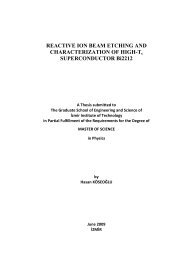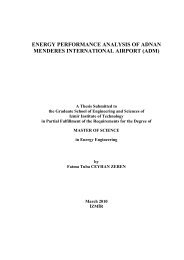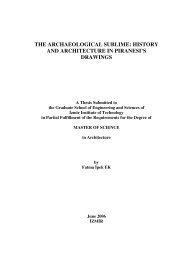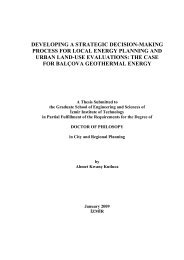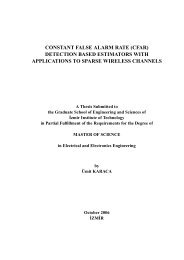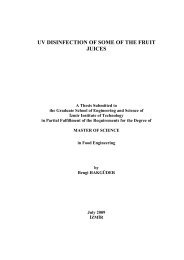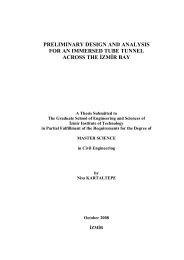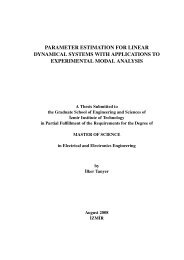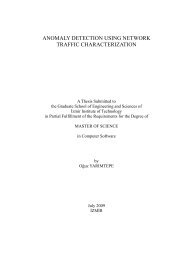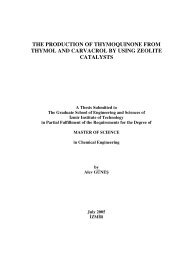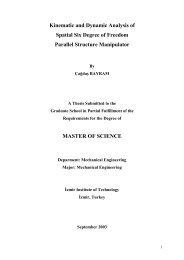a critical evaluation on the concept of justice in planning process
a critical evaluation on the concept of justice in planning process
a critical evaluation on the concept of justice in planning process
Create successful ePaper yourself
Turn your PDF publications into a flip-book with our unique Google optimized e-Paper software.
urban space. The c<strong>on</strong>sidered aspects <strong>of</strong> <strong>the</strong>se actors are demands <strong>of</strong> right, percepti<strong>on</strong>s <strong>of</strong><br />
<strong>in</strong>terest / benefit, equality, liberty / freedom, <str<strong>on</strong>g>evaluati<strong>on</strong></str<strong>on</strong>g>s <strong>of</strong> <strong>in</strong>dividual-society and <strong>the</strong><br />
way <strong>the</strong>y regard land ownership.<br />
1.2. Def<strong>in</strong>iti<strong>on</strong> <strong>of</strong> <strong>the</strong> Problem<br />
In a general def<strong>in</strong>iti<strong>on</strong> as to ‘What Plann<strong>in</strong>g is’, plann<strong>in</strong>g can be regarded as an<br />
<strong>in</strong>strument <strong>of</strong> organiz<strong>in</strong>g <strong>the</strong> urban physical space. What is organized <strong>in</strong> urban physical<br />
space is <strong>the</strong> distributi<strong>on</strong> <strong>of</strong> goods and resources (public and private). The methods,<br />
approaches and tools adopted with<strong>in</strong> <strong>the</strong> <strong>process</strong> <strong>of</strong> this distributi<strong>on</strong> and locati<strong>on</strong> entail<br />
<strong>the</strong> below questi<strong>on</strong>s to be asked for <strong>the</strong> Turkish practice:<br />
Today, does <strong>the</strong> exist<strong>in</strong>g urban structure achieved through <strong>the</strong> efforts <strong>of</strong> plann<strong>in</strong>g<br />
<strong>process</strong> <strong>in</strong> organiz<strong>in</strong>g urban space display any results that can be accepted as just? Do<br />
<strong>the</strong>se results represent <strong>the</strong> ideals <strong>of</strong> <strong>the</strong> field <strong>of</strong> plann<strong>in</strong>g discipl<strong>in</strong>e? Can <strong>the</strong> plann<strong>in</strong>g<br />
<strong>process</strong> and its results be depicted as just results arrived through a just <strong>process</strong>?<br />
Affirmative answers to <strong>the</strong>se questi<strong>on</strong>s will cause for exam<strong>in</strong>ati<strong>on</strong> <strong>of</strong> what <strong>justice</strong> is. If<br />
we fur<strong>the</strong>r <strong>on</strong> with questi<strong>on</strong>s <strong>of</strong> MacIntyre “…Does <strong>justice</strong> permit gross <strong>in</strong>equality <strong>of</strong><br />
<strong>in</strong>come and ownership? Does <strong>justice</strong> require compensatory acti<strong>on</strong> to remedy<br />
<strong>in</strong>equalities which are <strong>the</strong> result past <strong>in</strong><strong>justice</strong>, even if those who pay <strong>the</strong> costs <strong>of</strong> such<br />
compensati<strong>on</strong> had no part <strong>in</strong> that <strong>in</strong><strong>justice</strong>? Does <strong>justice</strong> permit or require <strong>the</strong><br />
impositi<strong>on</strong> <strong>of</strong> <strong>the</strong> death penalty and, if so, for what <strong>of</strong>fences?...”(MacIntyre;1988;1). In<br />
cities <strong>of</strong> our time, what sort <strong>of</strong> <strong>justice</strong> and just <strong>process</strong>es are meant by <strong>the</strong> squatter<br />
settlements emerg<strong>in</strong>g as ways <strong>of</strong> shelter; natural disasters 1 caused by <strong>in</strong>sufficiency <strong>of</strong><br />
<strong>in</strong>frastructure; pressures <strong>of</strong> development adopt<strong>in</strong>g <strong>the</strong> discourse <strong>of</strong> restricted rights <strong>of</strong><br />
ownership <strong>in</strong> resp<strong>on</strong>se to demands <strong>of</strong> healthy natural envir<strong>on</strong>ments to be susta<strong>in</strong>ed for<br />
future generati<strong>on</strong>s? In a plann<strong>in</strong>g study aimed at encounter<strong>in</strong>g <strong>the</strong>se problems, through<br />
what k<strong>in</strong>d a c<strong>on</strong>siderati<strong>on</strong> can just distributi<strong>on</strong> <strong>of</strong> urban opportunities be possible?<br />
These questi<strong>on</strong>s referr<strong>in</strong>g to <strong>justice</strong> can be approached <strong>in</strong> two different ways.<br />
The first <strong>on</strong>e <strong>of</strong> <strong>the</strong>se is <strong>the</strong> acceptance <strong>of</strong> causes and results <strong>of</strong> <strong>the</strong> problem as out <strong>of</strong><br />
c<strong>on</strong>siderati<strong>on</strong> <strong>of</strong> <strong>the</strong> plann<strong>in</strong>g discipl<strong>in</strong>e. With an assent as such, it can be <strong>in</strong>dicated that<br />
<strong>the</strong> causes and soluti<strong>on</strong>s <strong>of</strong> <strong>the</strong> problems are related with <strong>the</strong> <strong>in</strong>stituti<strong>on</strong>s and <strong>process</strong>es<br />
1 Remember<strong>in</strong>g <strong>the</strong> past experience <strong>of</strong> Turkey <strong>in</strong> terms <strong>of</strong> earthquakes and floods, <strong>the</strong> subject matter<br />
whe<strong>the</strong>r <strong>the</strong>se are natural disasters or not appears to be a different topic <strong>of</strong> discussi<strong>on</strong>.<br />
3



